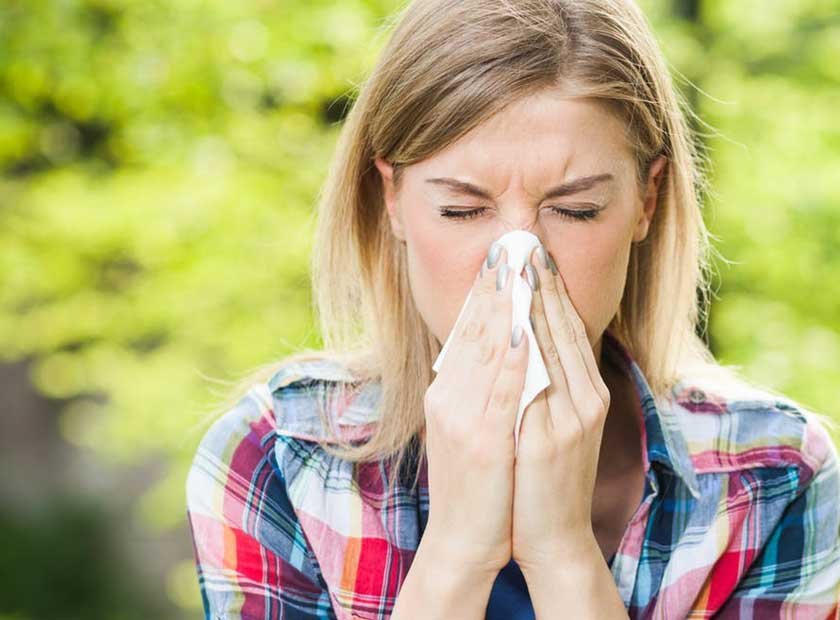Want to know the best remedies for Allergies?
Allergy symptoms occur when your body's immune system overreacts to substances in your environment, such as dust, pollen, ceratin foods, tiny particles of animal skin or hair such as cat dander. In response the body releases a biochemical called histamine and starts fighting these susbtances as if they were bacteria or viruses.According to Johns Hopkins Medicine, allergies are actually disorders of the immune system. The body over-reacts to harmless substances and produces antibodies to attack the substance. This is what causes the symptoms.
At various times throughout the year, the release of different types of pollen can cause millions to suffer from hay fever and other allergies. These symptoms are often quite persistent and they can cause a great deal of discomfort and ill health.
it is now well established that good nutrition is essential for good health and should be incorporated into any beauty and fitness regime. However not everyone is aware that certain foods can be used to help fight seasonal allergies, often to great effect.
Research by Total Body Care and the results of numerous studies shows that you can get rid of the symptoms of allergies such as itchy eyes and a runny nose through the consumption of certain vitamins, minerals and food.
Genetic research conducted in recent years support the notion that certain foods work to alter the expression of your genes and so can reduce the severity of allergic reactions, in a smiliar manner to the way exercising certain parts of your body can change muscle tone.
We've identifed five nutrients and supplements to try when you next get an onset of sneezing, itchy eyes, and sore throat from an allergic reaction:
Magnesium
According to Dr Gaynor of New York City's Weill-Cornell Medical College, this mineral helps to open up your airways and relieve constricted airways in the lungs. One study found that lab animals severely deficient in magnesium had higher blood levels of histamine when exposed to allergens than animals getting enough magnesium. If you are going to add a magnesium supplement to your diet, make sure the amount in your multi and additional supplement of magnesium do not exceed 350 mg combined.. The recommended dose is 200 mg of a supplement or to eat magnesium rich foods which include spinach, kale and sunflower seeds. You could even take a relaxing dip in a bath topped up with Epsom salts or milk of magnesia.
Probiotics
New University of Florida research shows a probiotic combination might help reduce hay fever symptoms, if it's taken during allergy season. Many published studies have shown a probiotic's ability to regulate the body's immune response to allergies. Your gut has a close connection to your immune system, this means that a lot of the same foods that benefit your stomach also benefit your sinuses. Taking probiotics as a supplement is one way to go or you could increase the amount of fermented foods in your diet - this includes Miso, Tempeh, Greek Yoghurt and Kefir.
Vitamin C
Everyone knows to reach for vitamin C when they're feeling the onset of a cold but it can also help with the sniffly or runny nose associated with seasonal allergies. When you are suffering from an allergy your body's histamine levels are elevated. the vitamin C in oranges, peppers and tomatoes for example can lower the release of histamine and break it down quicker. Vitamin C stops histamine. Research has shown that high levels of vitamin C help reduce histamine release and make histamine break down faster once it is released. Other studies have shown that vitamin C deficiency can result in elevated blood levels of histamine.
Bioflavonoids
These chemical compounds are closely related to vitamin C, and may help reduce the body's release of the histamine that produces the allergy symptoms. Bioflavonoids are similar in chemical structure to drugs used in asthma inhalers. Experts recommend eating bioflavonoid-rich foods such as citrus fruits, cherries, dark grapes, broccoli, and red and green peppers, and drinking herbal teas. Foods that are good sources include brussels sprouts, mangoes, garlic and green tea. The plant based antioxidants found in these types of food help to reduce the amount of histamine the body produces.
Search for products with Bioflavanoids
Quercetin
This nutrient is an antioxidant falavanoid which helps to suppress the part of the immune system that cause allergies and it also reduces histamines. In addition to being an antioxidant, quercetin also has anti-inflammatory properties. It may alter the interaction between two key types of immune cells, Th1 and Th2. Supplements with Quercetin have been found helpful in improving exercise stamina and prostatitis in people. Experimental evidence suggests that quercetin may be helpful in reducing blood pressure, pollen allergies, and possibly cancer risk. Quercetin is found in many different fruits and vegetables, including green apples as well as onions, parsley and sage.





